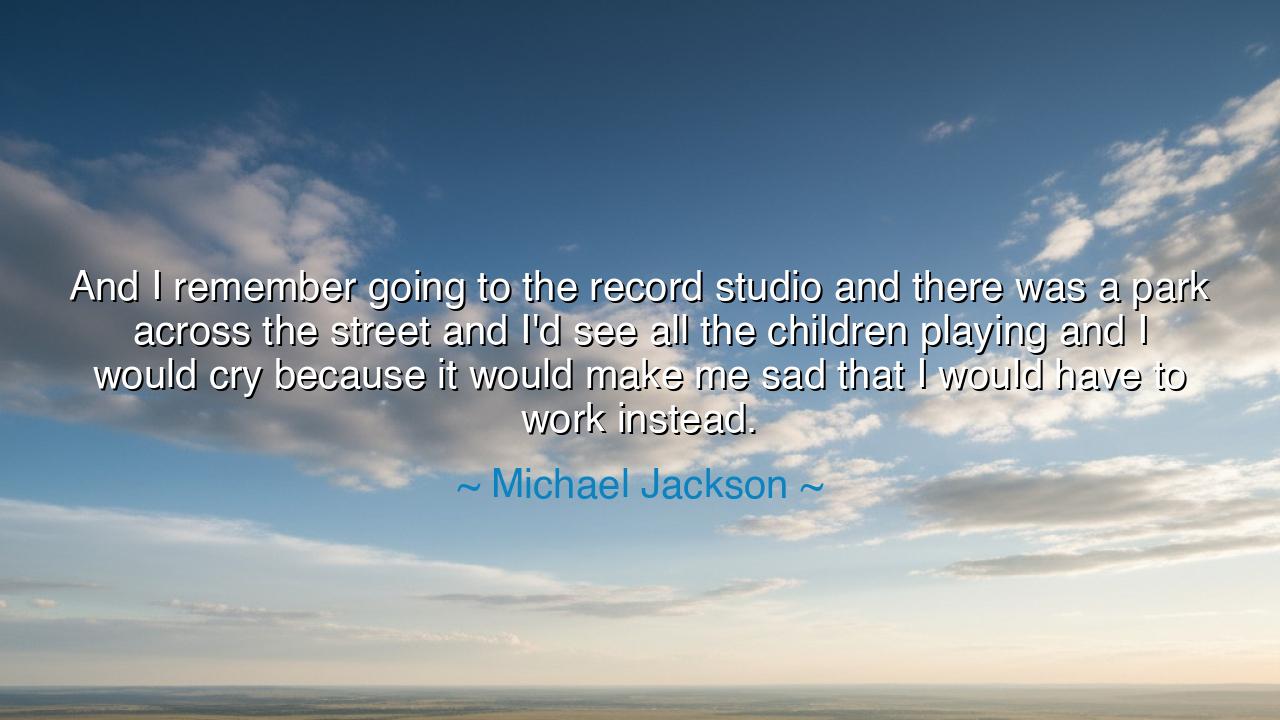
And I remember going to the record studio and there was a park
And I remember going to the record studio and there was a park across the street and I'd see all the children playing and I would cry because it would make me sad that I would have to work instead.






The immortal artist of music and spirit, Michael Jackson, once spoke with quiet sorrow: “And I remember going to the record studio and there was a park across the street and I’d see all the children playing and I would cry because it would make me sad that I would have to work instead.” In these tender words, he revealed a truth more piercing than fame itself—the cost of lost childhood, the pain of a life where duty devoured innocence. His confession is not only the lament of a prodigy burdened by greatness, but also a meditation on the fragile balance between dreams and sacrifice, between creation and the simple joy of being human.
The origin of this quote reaches back into Jackson’s early years, when as a child he became the dazzling center of the Jackson 5, performing before the world while other children played in the sun. He knew the exhilaration of applause, but not the easy laughter of youth. As he sat in recording studios, crafting songs that would one day make him a legend, he gazed through windows at the playground across the street and felt the ache of what he had traded. Those children represented a world he could see, but never touch—a world that for him had been replaced by rehearsals, expectations, and the unrelenting eye of fame. His tears, then, were not weakness, but yearning—a cry from the heart of a child who had been made into a myth too soon.
In his sorrow we find the echo of a universal truth: every gift demands a price. The poet who captures beauty loses sleep; the warrior who defends peace forfeits peace himself. So it was with Michael. The music that lifted millions from despair had been born of his own quiet suffering. His story reminds us that brilliance often walks hand in hand with burden, and that greatness—when imposed too early—can steal the gentleness from a soul. His tears in that studio were the tears of countless dreamers who have achieved what the world calls success, only to realize that what they lost was something infinitely purer.
This same theme runs through history. Consider Mozart, another child prodigy who dazzled Europe before he could even spell his own name. Like Jackson, Mozart’s life was a storm of expectation and pressure, his childhood consumed by performance and perfection. He, too, bore the curse of early genius—the world adored his music but forgot his humanity. And yet, through his pain, he gave us harmonies that still awaken hearts centuries later. These are the twin faces of genius: the radiant and the tragic, the joy of creation and the sorrow of isolation.
In Michael’s story, there is also the voice of motherly care and parental ambition. His father, Joseph Jackson, driven by vision and fear, believed he was securing his children’s future through strict discipline and endless work. But in doing so, he planted the seeds of pain that would follow his son forever. The lesson here is profound: in our desire to make our children exceptional, we must not forget to make them whole. For the measure of a life is not only in its achievements, but in its joy, its laughter, its freedom to play.
The lesson, then, is both tender and powerful: no dream, however glorious, should cost the soul its wonder. Work, ambition, and excellence are noble pursuits, but they must never replace the human need for rest, innocence, and connection. The child within us must not be silenced by duty; it must be nurtured, lest we become rich in fame and poor in peace. To live fully is to let both sides of the self—the artist and the child, the worker and the dreamer—breathe in harmony.
So, my child, remember the tears of Michael Jackson when you chase your ambitions. Let them remind you that joy is not something to be earned later, but something to be cherished now. Create, strive, and build—but never at the cost of the sunlight that warms your heart. Look to the park across your own street, wherever it may be, and do not forget to join the laughter there from time to time. For though the world may celebrate your triumphs, only you can protect the quiet happiness that makes life worth living.






AAdministratorAdministrator
Welcome, honored guests. Please leave a comment, we will respond soon